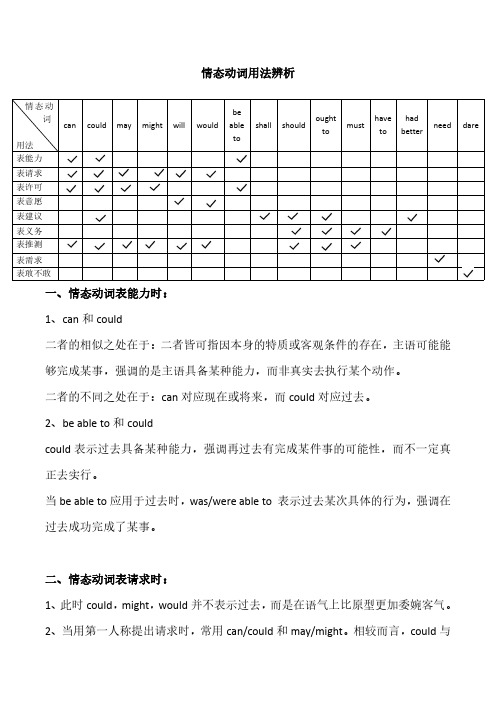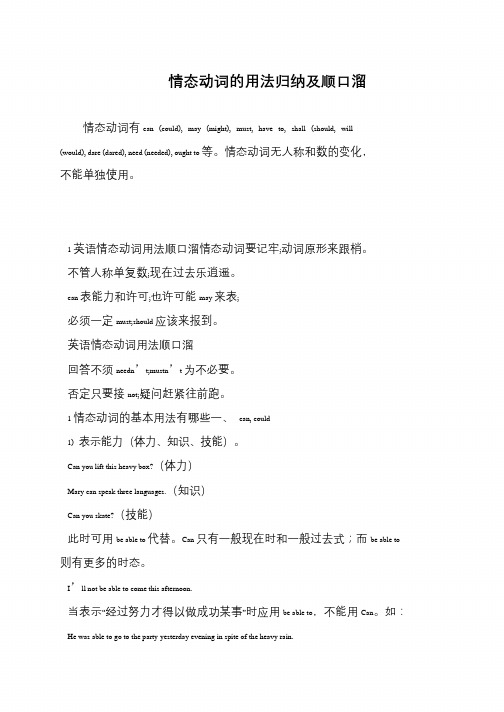情态动词的归纳
情态动词用法归纳(全)

You might have considered your parents' feelings. 你本可考虑你父母的感情的呀。
The director is alone now,So you may see him now . 局长现在是一个人,所以你可以现在去见他。 might 用于疑问句,语气更委婉,如: might I join you ? 我可以参加你们一起吗?
3) 表责备,只用might,用于肯定句,可用一般式和 完成式,完成式则表未实现的动作,如:
It could have been seen from here if it had not been so dark.
如果天不那么黑,你可能从这儿望见它的。(实际上已望不见)
3)表示请求和允许.
eg. You can borrow my bike tomorrow 明天你可以借用我的自行车
表这个意义时,can 用于疑问句时表要求,用于否定句时表不许,如:
You might ask before you borrow my car. 你可以先问问我再借我的车子嘛。
you might have helped me. 你完全可以帮我一把的呀。
4)May 与might的比较:
might 可表虚拟语气,may则不可以,如: It might help a little if you would only keep clean .
flowers.
情态动词归纳

情态动词情态动词是一种本身有一定的词义,但要与动词原形一起使用,给谓语动词增添情态色彩,表示说话人对有关行为或事物的态度和看法,认为其可能、应该或必要等。
情态动词后面加动词原形。
主要有14个can/could,may/might,will/would,shall/should,must,ought to,dare/dared,need,used to;一.情态动词的用法:常用的情态动词有can,may,must,need,should, had better.1. can的用法:①表示能力“能,会”eg: He can speak a little Japanese.他会说一点日语。
②表示请求或许可“可以”eg: Can I help you? 要我帮忙吗?③表示猜测“可能”eg: Where can she go now? 她可能到哪里去了呢?could用来表示请求时,语气委婉,主要用于疑问句,不能用于肯定句,答语应用can(即:could不能用于现在时态的简略答语中)。
如:——Could I use your dictionary?——Yes, you can.(否定回答可用:No, I’m afraid not.)can和be able to辨析can(could)和be able to都可以表示能力,意思上没有区别。
但can只有现在式和过去式,而be able to则有更多的形式。
如:I’ve always wanted to able to speak fluent English.Those bags look really heavy, are you sure you’ll be able to carry them on your own?但是,表示在过去某时的某一场合经过一番努力,终于做成了某事,通常不用could,而用was/were able to来表示。
这时,was/were able to相当于managed to do或succeed in doing。
情态动词用法归纳总结

情态动词用法辨析情态动词用法can could may might will would be able to shall should ought to must have to had better need dare表能力表请求表许可表意愿表建议表义务表推测表需求表敢不敢一、情态动词表能力时:1、can 和could二者的相似之处在于:二者皆可指因本身的特质或客观条件的存在,主语可能能够完成某事,强调的是主语具备某种能力,而非真实去执行某个动作。
二者的不同之处在于:can 对应现在或将来,而could 对应过去。
2、be able to 和couldcould 表示过去具备某种能力,强调再过去有完成某件事的可能性,而不一定真正去实行。
当be able to 应用于过去时,was/were able to 表示过去某次具体的行为,强调在过去成功完成了某事。
二、情态动词表请求时:1、此时could ,might ,would 并不表示过去,而是在语气上比原型更加委婉客气。
2、当用第一人称提出请求时,常用can/could 和may/might 。
相较而言,could 与may在表请求的问句中出现的频率最高;might表发请求的语气最为委婉客气,因此反而很少见;而can则常用于熟人间的对话中。
语气强度:can>could/might>might3、当用第二人称提出请求时,常用can/could和will/would。
其中could和would 表达请求的语气更委婉客气;而can与will则常用于熟人对话中。
语气强度:can/will>could/would三、情态动词表许可时:1、与表请求不同,will/would不论前接第几人称,都表示主语本身的意愿,无需得到他人的“许可”,所以will/would不可以用于表请求的句中。
2、can和may二者都可以表示对现在或将来动作的许可,其中can的使用频率更高。
情态动词有哪些 用法归纳及口诀

情态动词有哪些用法归纳及口诀
情态动词是英语中很重要的一类动词,暗含着说话者的态度,因此掌握好情态动词,对于把握说话者的意图,思想有着重要的作用。
现在总结如下。
1 情态动词四大分类①只做情态动词:may, might, must..
②可做情态动词又可做实义动词:如:need, dare,can.......
③具有情态动词特征:have(had,has) to,used to, ought to
④可做情态动词又可作助动词:如:shall(should),will(would)
注意
mustn’t代表强烈禁止must 表示主观,have to 表示客观。
美式英语中常用must not 而不用mustn’t.mayn’t,mightn’t和shan’t也很少
用
常用
can (could), may (might), must, need, ought to, dare (dared), shall (should), will
(would)
1 英语情态动词用法顺口溜情态动词要记牢;动词原形来跟梢。
不管人称单复数;现在过去乐逍遥。
can 表能力和许可;也许可能may 来表;
必须一定must;should 应该来报到。
英语情态动词用法顺口溜
回答不须needn’t;mustn’t 为不必要。
情态动词的用法归纳及顺口溜

情态动词的用法归纳及顺口溜
情态动词有can (could), may (might), must, have to, shall (should, will (would), dare (dared), need (needed), ought to 等。
情态动词无人称和数的变化,
不能单独使用。
1 英语情态动词用法顺口溜情态动词要记牢;动词原形来跟梢。
不管人称单复数;现在过去乐逍遥。
can 表能力和许可;也许可能may 来表;
必须一定must;should 应该来报到。
英语情态动词用法顺口溜
回答不须needn’t;mustn’t 为不必要。
否定只要接not;疑问赶紧往前跑。
1 情态动词的基本用法有哪些一、can, could
1) 表示能力(体力、知识、技能)。
Can you lift this heavy box?(体力)
Mary can speak three languages.(知识)
Can you skate?(技能)
此时可用be able to 代替。
Can 只有一般现在时和一般过去式;而be able to 则有更多的时态。
I’ll not be able to come this afternoon.
当表示“经过努力才得以做成功某事”时应用be able to,不能用Can。
如:He was able to go to the party yesterday evening in spite of the heavy rain.。
情态动词的用法归纳 情态动词有哪些

情态动词的用法归纳情态动词有哪些
情态动词有can,may,must,have to,shall,will,dare,need,ought to 等。
情态动词无人称和数的变化;不能单独使用,必须与其后的动词原形构成谓语。
1 英语情态动词的基本用法归纳一、can, could
1) 表示能力(体力、知识、技能)。
Can you lift this heavy box?(体力)
Mary can speak three languages.(知识)
Can you skate?(技能)
此时可用be able to 代替。
Can 只有一般现在时和一般过去式;而be able to 则有更多的时态。
I’ll not be able to come this afternoon.
当表示“经过努力才得以做成功某事”时应用be able to,不能用Can。
如:
He was able to go to the party yesterday evening in spite of the heavy rain. 2) 表示请求和允许。
-----Can I go now?
----- Yes, you can. / No, you can’t.
此时可与may 互换。
在疑问句中还可用could,might 代替,不是过去式,只
是语气更委婉,不能用于肯定句和答语中。
---- Could I come to see you tomorrow?
---- Yes, you can. ( No, I’m afraid not. )
3) 表示客观可能性(客观原因形成的能力)。
小学中的常见情态动词知识点的归纳与解析

小学中的常见情态动词知识点的归纳与解析情态动词在英语语法中起着非常重要的作用。
对于小学生来说,了解和正确使用常见的情态动词是构建良好语言基础的关键。
本文将对小学中的常见情态动词知识点进行归纳与解析,帮助学生更好地掌握这些语法要点。
一、常见的情态动词1. can:表示能力、许可或可能性。
例如:I can swim.(我会游泳。
)2. could:表示过去的能力、许可或可能性。
例如:When I was young, I could run very fast.(当我年轻时,我能跑得很快。
)3. may:表示许可或可能性。
例如:May I go to the bathroom?(我可以去洗手间吗?)4. might:表示过去或将来某个时间的可能性。
例如:He might come to the party tomorrow.(明天他可能会来参加晚会。
)5. shall:表示应该或将要发生的事情。
例如:Shall we go to the park tomorrow?(我们明天去公园好吗?)6. should:表示应该做的事情。
例如:You should eat fruits and vegetables every day.(你每天应该吃水果和蔬菜。
)7. will:表示将要发生的事情或意愿。
例如:I will help you withyour homework.(我会帮你做作业。
)8. would:表示过去的意愿、习惯或建议。
例如:When I was a child,I would always play with my friends.(当我还是个孩子时,我总是和朋友们一起玩。
)9. must:表示必须或对某种情况的肯定。
例如:You must finish your homework before watching TV.(你必须先完成作业再看电视。
)10. ought to:表示应该或理应做的事情。
(完整版)情态动词归纳表

情态动词归纳表高考热点透视热点一:表猜测的情态动词的用法。
热点二:情态动词+have done情态动词+have done的用法有两种含义:1. 对过去情况的猜测。
由表猜测的情态动词+have done构成。
上表已经提到。
2. 表示与过去事实的主观设想。
有轻微的责备、后悔之意。
请参看下表:热点三:shall,will,must等1. Shall ①用于第一人称疑问句中表示说话人征求对方的意见或向对方请求。
例:—The room is so dirty. _______ we clean it?—Of course. ( 03 上海春招)A. WillB. ShallC. WouldD. Do②用于第二人称陈述句表示说话人或他人的意图、命令、允诺、警告、命令等。
例:“The interest _______ be divided into five parts, according to the agreement made by both sides,” declared the judge. (04 重庆,24)A. mayB. shouldC. mustD. shall2. Will ①表示意愿或意志。
例:I __________ argue with you.②当主语是物时,则表示“不起作用”。
例:The drawer _________ shut.3. Must 表“必须、一定要”。
例:— Who is the girl standing over there?— Well, if you _______ know, her name is Mabel. (02,天津)A. mayB. canC. mustD. shall。
- 1、下载文档前请自行甄别文档内容的完整性,平台不提供额外的编辑、内容补充、找答案等附加服务。
- 2、"仅部分预览"的文档,不可在线预览部分如存在完整性等问题,可反馈申请退款(可完整预览的文档不适用该条件!)。
- 3、如文档侵犯您的权益,请联系客服反馈,我们会尽快为您处理(人工客服工作时间:9:00-18:30)。
情态动词的归纳一、单项选择情态动词1.Look! There are so many mistakes in your composition. You ________ have fixed full attention on it.A.can B.shouldC.need D.might【答案】B【解析】【详解】考查情态动词。
句意:看!你的作文里有那么多的错误。
你本应该把所有的注意力都集中在它上面的。
表示“本应该做但实际上没有做”应该用should have done结构,can have done 表示可能;need表示需要;might have done表示可能做过某事;故选B。
2.Keep up your spirits even if you _____ fail hundreds of times.A.must B.needC.may D.should【答案】C【解析】【详解】考查情态动词。
A. must必须;B. need需要;C. may可能,或许;D. should应该。
句意:即使失败了几百次,也要振作起来。
此处表示一种不确定的推测,故选C。
3.It has been announced that all the candidates ___________ remain in their seats until all the papers have been collected.A.shall B.couldC.would D.ought【答案】A【解析】【详解】考查情态动词用法。
句意:据宣布,所有的候选人都要坐在位置上,直到所有的试卷都被收齐。
根据句意可知本句是考试规则,情态动词shall可以表示“按照规则/规定/法律要做的事情”,符合本句语境。
故A项正确。
4.I often felt troubled in my teens and my grandma ________ comfort me, saying “Life is like that, dear”.A.would B.might C.should D.must【答案】A【解析】【详解】考查情态动词。
句意:在我十几岁的时候,我经常感到烦恼,我的奶奶会安慰我说,“生活就是这样,亲爱的”。
此处是would+动词原形,表示“过去总是做某事”。
故选A。
5.It wa sn’t right to me that such near neighbors not know one another.A.could B.wouldC.should D.might【答案】C【解析】【详解】考查情态动词。
句意:对我来说,很不正常,如此近的邻居居然不认识。
A. could可能,能够;B. would将;C. should竟然;D. might可能,也许。
should 作为情态动词,可以用来表示意外、惊喜或者在说话人看来是不可思议的,常常译为"竟会"、"居然",住的这么近的邻居居然不认识。
表示意外,所以答案选C。
【点睛】should的用法1、should 作为情态动词,通常用来表示现在或将来的责任或义务,译作“应该”、“应当”,这时它可以和 ought to, be supposed to 互换使用.例如:You should (= ought to ) tell your mother about it at once.2、should 作为情态动词,可以用在条件状语从句中,表示语气较强的假设,译作“万一”、“竟然”,这时也可将 should 置于从句之首,即将 should 放在主语前面,而省略从属连词 if。
例如:If you should fail to come, ask Mrs Chen to work in your place. (= Should you fail to come, ask Mrs Chen to work in your place. )3、should 作为情态动词,可以表示谦逊、客气、委婉之意,译为“可……”、“倒……”。
例如:I should say that it would be better to try it again.4、should 作为情态动词,可以用来表示意外、惊喜或者在说话人看来是不可思议的.尤其在以 why, who, how 等开头的修辞疑问句或某些感叹句中常常译为“竟会”、“居然”。
例如:How should I know it ? 我怎么会知道这件事?5、should 作为情态动词,可以用来表示有较大可能实现的猜测、推论,通常译为“可能”、“总该……吧”,相当于 be expected to 。
例如:They should be home by now, I think. 我想现在他们总该到家了吧。
6、should 作为情态动词,用在由 so that, for fear that, lest 引导的目的状语从句和 in case (that)引导的条件状语从句中,有“能够”、“可能”、“会”之意。
例如:They got up early so that they should (= could/ might) catch the first bus in time.7、should 作为情态动词,可以用于下列虚拟语气句中:(1)用在表示与将来事实相反的条件状语从句中,构成“ If …… should (do sth)……, …… would/ could/ might (do sth.)…… ”句式。
(2) 用在 suggest (propose), arrange, plan, decide, advise, order, demand, request, desire, insist 等表示“建议”、“要求”、“命令”、“决定”、“安排”、“计划”、“主张”的动词后面接的宾语从句中。
这里的 should 也可以省略。
本句中should 作为情态动词,可以用来表示意外、惊喜或者在说话人看来是不可思议的,常常译为"竟会"、"居然",住的这么近的邻居居然不认识。
表示意外,所以答案选C。
6.would可以表达过去常常做的事,过去习惯发生的动作:Pirates would bury gold in a cave. 海盗们常常把黄金藏在山洞中。
We would take a walk along the river. 我们过去常常沿河散步。
3. would后接like、love、mind等动词,表示要求、邀请、希望或询问,此时不是说过去,而是对现在的询问:Would you like to come to my party? 你愿意来我的派对吗?Would you mind coming with us? 你介意和我们一起吗?比如本题,would 表示婉转的请求,征求对方的意见,故选A。
7.—What happened to the young trees we planted last week?—The trees ________ well, but I didn’t water them.A.might grow B.needn’t have grownC.would have grown D.would grow【答案】C【解析】考查虚拟语气。
——我们上周种的小树怎么了?——这些小树本来会长得很好,但是我们没有给它们浇水。
根据语境可知,此处是对过去的事实进行假设,故本题选C。
8.It has been announced that all the students ________ put on masks before going to school in case they are infected with SARS virus.A.shall B.will C.need D.may【答案】A【解析】【详解】【详解】考查情态动词。
句意:所有学生们应在去学校之前带上口罩以防感染非典病毒,这已经被宣布。
shall用于第二、第三人称,表示说话人给对方命令、警告、允诺或威胁,故选A 项。
9.Mark ______ have hurried. After driving at top speed, he arrived half an hour early. A.needn’t B.wouldn’t C.mustn’t D.couldn’t【答案】A【解析】考查情态动词。
need’t have done 本不必要做某事,句意:迈克本不必要着急的。
他以全速驾驶后,他早到了半个小时。
wouldn’t不会,mustn’t禁止,couldn’t不可能,所以选A。
10.---Can I pay the bill by credit card?---Sorry, sir. But it is the management rules of our hotel that payment ______________ be made in cash.A.shall B.needC.will D.must【答案】A【解析】【详解】考查情态动词词义辨析。
A. shall用于法律法规或条文中,表示义务、规定等;B. need需要;C. will会;D. must必须。
句意:——我能用信用卡支付么?——对不起,先生,现金支付是我们酒店的管理规定。
故A项正确。
11.— Excuse me, could you please tell me how to get to the nearest Wenfeng Supermarket?— O K, It’s two blocks straight ahead. You ________ miss it.A.can’t B.mustn’tC.needn’t D.wouldn’t【答案】A【解析】【详解】考查情态动词。
句意:——劳驾,你能告诉我最近的Wenfeng Supermarket怎么走吗?——好的,一直往前走两个街区就到了。
你不会错过的。
A. can’t不可能;B. mustn’t禁止,不允许;C. needn’t不必;D. wouldn’t不会。
故选A。
12.—I saw your uncle take a taxi to the airport. Why didn’t you drive him there?—I __________. But my car ___________ .A.would; was fixed B.would have; was fixedC.would have; was being fixed D.did; was being fixed【答案】C【解析】【详解】考查虚拟语气和动词时态。
